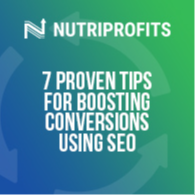Everyone makes mistakes. Whether you’re an experienced affiliate marketer or just starting out in the field, you’re bound to mess up sometimes. You can't avoid ever making any mistakes as an affiliate marketer. You can make sure to avoid some of the more common affiliate marketing mistakes that people often run into.
Accordingly, we’ve put together a list featuring some of the biggest mistakes in affiliate marketing. While this list might not contain all the potential pitfalls you might run into, it can still help you succeed as an affiliate marketer.
Opting for the Wrong Niche
Generally speaking, this particular error can be subdivided into two distinct types. The first of these common affiliate marketing mistakes crops up when you choose a niche that doesn’t work with your audience.
Usually, this happens when an established affiliate marketer tries to pick a new niche that doesn’t fit their primary audience. For example, an affiliate marketer might suddenly decide to try promoting weighted blankets on a cooking blog.
This might sound like an obvious mistake to avoid, but it’s surprisingly easy to do. All that needs to happen is for you to fall into the trap of picking out niches based entirely on their popularity. However, you might also run into trouble if you opt for an overly specific niche. The problem, in this case, is that even figuring out the right places to find your intended audience might be harder.
The second variation on this mistake is selecting a niche that doesn’t reflect your interests or knowledge base. Your audience can often tell whether you have any actual interest in or knowledge about the products you’re promoting or not.
This chiefly matters because it impacts how much your audience is likely to trust you or respect your opinion. After all, if your audience believes that you don’t know what you’re talking about, they’re not going to have much reason to think anything you have to say about your product is worth paying attention to, let alone trusting.
Neglecting Search Engine Optimization (SEO)
Search engine optimization, commonly referred to as SEO, is one affiliate marketing tool that is not to be underestimated. Failing to optimize your affiliate content effectively is a common reason why affiliate marketing does not work.
Put simply, not using SEO makes it much more difficult for people to find your affiliate marketing results. Keep in mind that if no one knows about you or can even find your content, they can’t click on your affiliate links. Given that the entire point of affiliate marketing is to get your audience to click those links, that’s rather a big problem.
As a result, SEO is something you can’t afford to get wrong. Practically speaking, this means that you absolutely need to do your research. As an affiliate marketer, you should know the SEO best practices and things like the best keywords for your content.
We also strongly advise taking advantage of one or more SEO tools if you aren’t already doing so. You don't even need to worry about paying for an SEO tool. We encourage you to consider trying one of the numerous free SEO tools available online.
Frequently Opting for Quantity Over Quality
Being able to maintain a good amount of affiliate content is inarguably an essential part of affiliate marketing. This is especially true if you want to make money. After all, if you don’t produce enough content, you aren’t going to become very successful.
That said, if you promote too many different products at once, you risk spreading yourself a little too thin. This is especially easy to do if you’re trying to juggle multiple websites and merchants at the same time.
Overextending yourself might be tempting to do. It can be tricky early on while you’re still figuring out how much you can take on without getting overwhelmed. Unfortunately, the cost of getting a high quantity of content out tends to be a reduction in quality.
The problem with this is that a big part of what sets high-quality content apart is that it considers the audience’s wants and needs. If your affiliate content doesn’t do this, then your audience is less likely to click on your affiliate links.
Avoiding Analytics
Analytics is a corner of affiliate marketing that many affiliate marketers tend to steer clear of for the most part. Most affiliate marketers do pay attention to how many sales they generate on their affiliate sites. However, they often don’t do much more than that.
Unfortunately, this is arguably one of the biggest mistakes in affiliate marketing. Analytics can be, if properly used, an incredible resource you can draw on. You can use affiliate analytics to find out everything from organic traffic patterns to the best options for online marketing channels.
Beyond even that, affiliate analytics can help you develop a better understanding of what your target audience wants and why they are. Affiliate analytics can also be a tremendous aid in figuring out which campaigns, products, and content work best for you. This allows you to adjust your strategies accordingly.
Practically speaking, what this all means is that the only thing you’re really going to accomplish by ignoring affiliate analytics is accidentally depriving yourself of a major source of valuable information.
Setting Unrealistic Financial Goals
It’s easy for inexperienced affiliate marketers to set implausibly high financial goals for themselves when they first start out in affiliate marketing. Unfortunately, such individuals are generally going to be disappointed.
While affiliate marketing can be a very profitable endeavor, it’s not going to start that way. Building yourself up as an affiliate marketer to the point that you have a shot at meeting those early financial goals is bound to take time, patience, and hard work. That said, if you’re willing to put in the necessary time and effort, affiliate marketing can be not only profitable but also incredibly rewarding.
If you've already built up an idea of affiliate marketing as an easy way to make a ton of money, it can be tremendously discouraging when you realize that affiliate marketing doesn’t work like that. In some cases, this discouragement is severe enough that new affiliate marketers give up entirely on affiliate marketing.
A Lack of Evergreen Content
In essence, evergreen content is content that won’t stop being relevant for a long time–if it ever does. Using evergreen content is a popular SEO method. It ensures that Internet traffic will be nudged toward a particular source. Better yet, it makes sure that traffic keeps going that way, even years after the original publication of that source.
If you don’t focus on producing evergreen content, there’s a good chance you will end up promoting products that will be quickly forgotten about or outdated. Promoting a product with a short shelf life means that your affiliate content will quickly become irrelevant, which isn’t what you want at all.
A good way to avoid this happening is to make a point of focusing your efforts on trustworthy merchants that you expect to be around for a long time and on products that are similarly likely to last. While you don’t need to ensure every single piece of affiliate content is evergreen, it’s safe to say that the more evergreen content you have, the better.
Conclusion
Sometimes mistakes happen. But learning about the problems other affiliate marketers have run into is an excellent way to avoid making those mistakes yourself. Even if you’ve already made one of these mistakes, don’t worry.
All that means is that you may want to adjust your affiliate marketing strategies slightly. There’s no reason that you can’t succeed as an affiliate marketer–mistakes and all. If you want to try affiliate marketing, we recommend you consider joining the NutriProfits affiliate program.





.jpg)

-1-1.jpg)